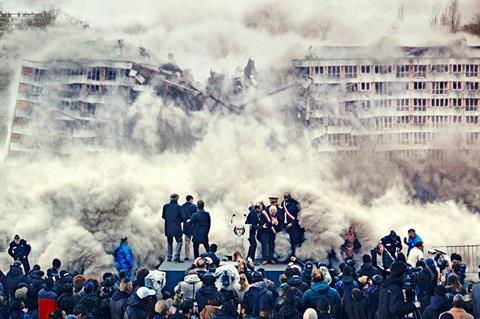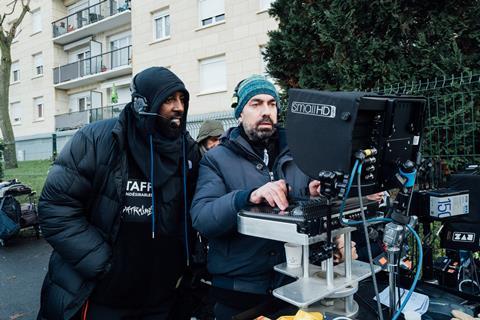Four years after his explosive debut feature Les Misérables, Ladj Ly returns with follow-up Les Indésirables. The French filmmaker speaks to Screen.

The son of Malian immigrants who grew up in a rough suburb on the outskirts of Paris, Ladj Ly burst onto the filmmaking scene in 2019 with his explosive debut feature Les Misérables. The film, which won the jury prize at Cannes and was Oscar-nominated in the international feature category, ended with a violent stand-off between a police officer and a young boy in the staircase of a dilapidated building, cutting to dark as the camera zooms in on their faces, leaving viewers to speculate on the outcome.
A critical and commercial hit earning $5.4m (€5m) outside of France and selling 2.1 million tickets at home against a $1.5m (€1.4m) budget, Les Misérables won four César awards including best film. It even received praise from French president Emmanuel Macron, who vowed to look for ways to ameliorate the situation on the ground. Nearly four years later, however, little has changed back in Ly’s native France and, especially, in his former neighbourhood of Montfermeil where he returns for Les Indésirables (the film has its world premiere at Toronto in Special Presentations).
Drawn from experience
Les Indésirables begins where Les Misérables ends, in the staircase of another rundown suburban edifice known as Bâtiment 5 (the film’s French title) and where Ly lived before he was forced to evacuate when it was destroyed as part of a local housing renewal plan. The building is the backdrop for the story of Pierre (Les Misérables star and co-writer Alexis Manenti), the young doctor-turned-mayor of a fictional underprivileged neighbourhood on the outskirts of Paris who goes head-to-head against Haby, a young French woman of Malian origin (newcomer Anta Diaw) who refuses to see her family and community driven away in the name of urban development.
Ly reteams with Srab Films’ Toufik Ayadi and Christophe Barral, who produce alongside the director’s own Lyly Films. He also reteams with co-writer Giordano Gederlini, cinematographer Julien Poupard, French distributor Le Pacte and international sales agent Goodfellas as well as returning cast members Manenti, Steve Tientcheu and Jeanne Balibar, who join fresh faces like Diaw and Aristote Luyindula among an ensemble that features mostly local residents. “Of the actors, 75% are people from the neighbourhood,” says Ly. “The idea was to use the same team from Les Misérables and embark on this adventure all together.”
Like his debut feature, Les Indésirables “is inspired by what I’ve lived and experienced for the past 30 years”. It is very loosely based on Claude Dilain, who was mayor of Clichy-sous-Bois for 16 years. “That was the starting point,” says the director, “this character who had lived through riots there and spearheaded urban renovations. But with time and as I wrote, it turned into something else.”
Manenti’s mayor is far from the big-hearted idealist Ly describes when talking about Dilain. “I wanted him to be a right-wing mayor pitted against his residents, like the many mayors in France who are not happy with these people [low-income housing residents] living in their cities even though the law states that 20% of housing must be reserved for them,” Ly says. “They prefer to pay a fine instead of letting them live there.” For Ly, the film’s “indésirables” are “the people no-one wants to live in these places, who feel like they are undesirable even in their own homes. The police often use the word ‘les nuisibles’ or ‘pests’ and ‘vermin’ to talk about them.”
Les Indésirables filmed from December 2022 to February 2023 in a building next door to Ly’s own, whose residents were being forced to vacate in real time. “Many of the families were still living there, so this was a challenge because they knew they would have to leave and we knew we had to shoot everything before they destroyed the building,” says Ly. “Some of them will be relocated, others deported. Many of these families had been living there for 20, 30, 40 years. It’s a disaster to have to leave one’s home.”
Personal stories

So how did Ly end up right back where he started? “The success of Les Misérables was amazing,” he reflects. “The offers flooded in for big films with big budgets. But that’s not what I wanted to do. As a filmmaker, it’s important for me to tell my own stories and not stories about things I know nothing about. One day, maybe.” So after the Césars and Oscar nomination, he went back to “my little building, the Bâtiment 5. I continued to live there and I said my next film would be shot there.”
What has changed is the film’s budget: $7.6m (€7m) compared to Les Misérables’ $1.5m. “Today, financiers see things differently. We got what we needed this time and filmed in good conditions with 200 extras and three cameras,” says Ly.
Both Les Misérables and Romain Gavras’ Athena, which Ly co-wrote, eerily foreshadow the fiery riots that shook France in June following the fatal shooting of a teenager by police. Ly was putting the finishing touches to Les Indésirables in the edit suite at the time. “What’s sad is that for the past 40 years, things haven’t changed,” he laments. “There was Mathieu Kassovitz’s La Haine in 1995; [nearly] 25 years later, there was Les Misérables. Things continue to go downhill. The tensions between police and people who live in more underprivileged neighbourhoods are disastrous.”
The June riots in France hit particularly close to home. “It hurts,” Ly admits. “It makes us feel like all the work we do serves no purpose because the same stories are repeating themselves over and over again.”
The filmmaker is not sitting around complaining, however, and is instead arming himself with a camera and crew. “We keep fighting. We continue to denounce what’s happening, we continue to act as witnesses. It’s important. Even if things aren’t moving on the other side, we do our job as artists.” Ly has also taken other concrete actions, founding the Kourtrajmé film school in 2018 which has branches in Montfermeil, Marseille, Dakar and a fourth school in Guadeloupe which is free and open to everyone. “The goal is that everyone can have the opportunity to make films,” he says.
Ly has plans to follow Les Misérables and Les Indésirables with one more film in the same milieu, creating a trifecta of French social-justice dramas. “The next one will be set in France in the 1990s,” he says of the project, which Srab is attached to produce with Goodfellas on board for international sales.
“I want people all over the world to be able to see what’s really happening in France. Through my films, I try to act as a witness for what’s going on in this country, and, in particular, in these neighbourhoods, anchored in reality with real people.”

























No comments yet